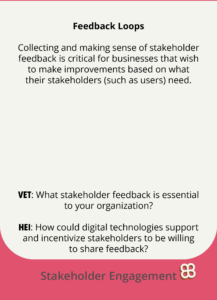Feedback loops
User feedback loops, supported by digital technologies, play a crucial role in building and strengthening the relationship between users and the products and services provided by fashion companies. A user feedback loop refers to the continuous process of gathering feedback from users, analyzing it, and using the insights to improve products, services, and overall customer experiences.
Digital technologies offer numerous advantages in establishing effective user feedback loops in the fashion industry. They enable efficient and scalable data collection, analysis, and communication, allowing fashion brands to gather feedback from a wide range of users and make informed decisions based on the insights gained.
To build or strengthen a feedback loop between users and fashion companies, several methods and incentives can be utilized. Here are some approaches commonly used:
Online surveys
Fashion brands can use online surveys to gather structured feedback from users. These surveys can be designed to capture specific information, such as user preferences, satisfaction levels, or suggestions for improvement. By offering incentives like discounts, exclusive access, or loyalty rewards, companies can encourage users to participate in surveys and share their opinions.
Ratings and reviews
By providing a platform for users to leave ratings and reviews for products and services, fashion companies can collect valuable feedback. Users are often willing to share their experiences and provide ratings and reviews when they feel their input is valued. Brands can showcase their responsiveness by actively engaging with user reviews and addressing any concerns or issues raised.
Social media listening
Fashion brands can leverage social media platforms to monitor and analyze user conversations, mentions, and sentiments related to their products and services. This allows companies to gain real-time insights, identify trends, and address customer concerns promptly. Engaging with users on social media platforms also fosters a sense of community and encourages users to share their feedback openly.
User testing and beta programs
Fashion companies can involve users in the testing and development phases of new products or features. By inviting users to be part of beta programs or user testing sessions, companies can collect valuable feedback on usability, functionality, and overall user experience. This approach not only provides insightful feedback but also engages users in the product development process, making them feel valued and invested in the brand.
Personalized communication
Fashion companies can establish personalized communication channels, such as email newsletters or loyalty programs, to regularly engage with users and seek their feedback. By providing exclusive content, personalized offers, and early access to new collections or features, companies can incentivize users to provide feedback and actively participate in shaping the brand’s offerings.
Case studies
Nike Run Club
Nike Run Club is a mobile app that caters to runners of all levels. The app incorporates a user feedback loop by providing features like post-workout surveys and personalized training plans. Nike leverages this feedback to enhance the app’s functionality, tailor training programs, and improve the overall user experience, thereby building a loyal community of runners.
Warby Parker
Warby Parker, an eyewear retailer, utilizes a user feedback loop to refine its product offerings and customer experience. They offer a “Home Try-On” service, allowing users to select and try on frames at home before making a purchase. Users provide feedback on the frames they try, helping Warby Parker improve the selection, fit, and style options available.
ModCloth
ModCloth, an online retailer specializing in vintage-inspired clothing and accessories, places a strong emphasis on user feedback. They encourage customers to share their experiences and provide feedback on the fit and quality of the items they purchase. ModCloth uses this feedback to refine their sizing and product descriptions, ensuring a better shopping experience for their customers.
Uniqlo
Uniqlo, a Japanese casual wear brand, actively seeks customer feedback through various channels, including surveys and social media. They gather insights on customer preferences, product satisfaction, and potential areas for improvement. Uniqlo uses this feedback to inform their product development, marketing strategies, and overall customer experience.
References
The Fetishization of Transparency.” Kate Fletcher, 13 Feb. 2022, katefletcher.com/the-fetishization-of-transparency/.
Liu, Na, et al. “Fashion platform operations in the sharing economy with digital technologies: recent development and real case studies.” Annals of Operations Research (2022): 1-21.
Vehmas, Kaisa, et al. “Consumer attitudes and communication in circular fashion.” Journal of Fashion Marketing and Management: An International Journal (2018).
